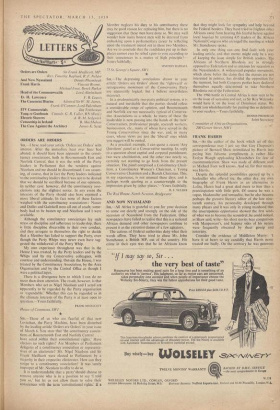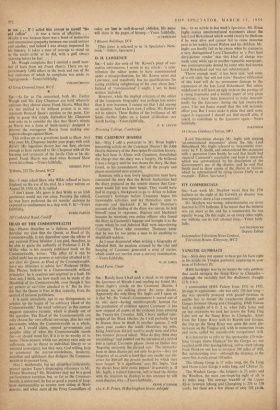FRANK HARRIS
Sat,—As the author of the book which set off this correspondence may I just say that Guy Chapman's picture of •Bernard Shaw intimidated by Harris into paying him fulsome compliments is rather like Evelyn Waugh applauding Khrushchcv for fear of excommunication. Shaw was made of different stuff as Michael Foot well knows. And so, An- that matter, was Harris.
Despite the splendid possibilities opened up by a bookseller who offered me, the other day, my own biography of Frank Harris as an alternative to tolita, Harris had a great deal more to him than a preoccupation with little girls. Of course he was a rogue, blackmailer and sensualist, but he also became perhaps the greatest literary editor of the late nine- teenth century, his personality developed through many phases and it was only in young manhood that the unscrupulous opportunist showed the first seeds of what was to become the scoundrel; he could indeed. as Shaw said, write—his short stories bear comparison with Maupassant's, and happier sides of his nature were frequently obscured by sheer gossip and notoriety.
Consider the evidence of Middleton Murry : 1 have it at heart to say candidly that Harris never treated Me badly. On the contrary he Was generous to me. /f I called him always to myself "the old ruffian" . . . it was a term of affection. . . . Maybe it was because there was a bond of instinctive and unconscious sympathy between one social outcast and another; and indeed I was always impressed by his bravery. It takes a man of courage to stand up to the social order as he did, with a gulf always yawning before his feet. . .
Mr. Waugh complains that I omitted a small num- ber of facts from my Frank Harris. There are ap- proximately 5,000 others in the book and one of the key omissions of which he complains was made on legal grounds.—Yours faithfully, VINCENT BROME 4.5 Great Ormond Street, WCI



















































 Previous page
Previous page